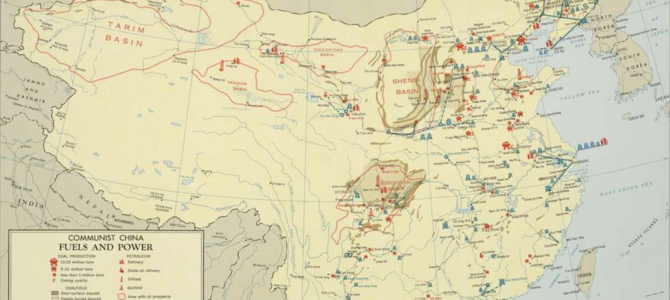
In China, we are dealing with a unique and formidable cultural entity, Robert Kaplan warned in a superlative essay last year.
“The American foreign policy elite does not like to talk about culture since culture cannot be quantified, and in this age of extreme personal sensitivity, what cannot be quantified or substantiated by a footnote is potentially radioactive. But without a discussion of culture and geography, there is simply no hope of understanding foreign affairs,” Kaplan wrote.
With the Wuhan coronavirus accelerating the course of history, including the coming geopolitical split and spheres of influence, the issue of culture and civilizational clash is back to the forefront. Culture is unique in determining foreign policy, and people, especially in Western academia, are loath to touch culture as a subject, partly because it is impossible to differentiate the facts on an individual level from the civilizational level. But history shapes culture, which in turn shapes policy.
Culture Is Not Individual
It is understandable that a country with no naturally defensible frontiers, such as Russia — which has been historically invaded by Mongols, Swedes, Poles, Ottomans, Napoleon, the Kaiser, and Adolf Hitler — will have its foreign policy shaped by skepticism of foreign military powers and believe in “might is right” policies more than values or norms. That doesn’t mean individual Russians are paranoid people; far from it. But it does mean Russian foreign policy will be far more pessimistic than Anglo-American, which is more idealist.
Likewise, current issues in the European Union about shared financial woes post-coronavirus have divided the continent along cultural lines. The frugal and austere North Europeans, led by the Dutch and Germans, are refusing to share the financial burden with Italy and Spain, with the now-notorious comment from a former Dutch minister about how South European countries are like men who have spent all their money on women and drinks, and now want North Europeans to pay.
Again, although individual people are irrelevant to cultural trends, this topic is toxic for analysts, as analysis often hinges on unquantifiable characteristics, which might result in biases. With the coronavirus, however, questions of culture are back in analytical vogue. As with any situation of crisis and despair, there’s a return of Samuel Huntington’s civilizational clash thesis.
Daniel Strand writes that the coming cold war with China is inevitable, due not only to strategic considerations, but the cultural issues that shaped them, “fueled by an abiding, almost millenarian, American belief that liberal democracy is the best form of government and that it must ultimately win the day.” Strand adds, “Francis Fukuyama predicted that with the fall of communism in the late 1980s we arrived at ‘the end of history.’ Liberal democracy was the final goal of a long historical process that we finally reached.”
But that era is over, burned to the ground. Strand channels Graham Allison, the author of a book about the Thucydides Trap, the idea that a rising power is typically determined to topple the established hegemon, thereby leading to conflict. “The differences between cultures are deep and will not change quickly, if at all,” Strand argues, stating that the historial experience in Iraq, Iran, Syria, Russia, China, and Saudi Arabia will not be something Westerners will ever find acceptable.
That doesn’t mean there will be a conflict; there might also be cooperation based on shared interests. But overall, “cultural assumptions are enduring, and even if some can shift over time, some cannot. That is a reality we should accept.” Allison agrees. In an essay in Foreign Affairs, Allison argues that Washington should prepare for an eventual decoupling and coexistence based on spheres of influence. Andrew Michta espoused similar arguments about hard decoupling due to cultural incompatibility.
Allies Despite Cultural Differences
It is interesting to fall back to Huntington in times of crisis, but he is more complicated than anyone gives him credit for. He never argued that different civilizations would clash and not co-exist. Rather, he argued there would be fault lines between various civilizations, making them prone to conflict. For example, the South China Sea, East China Sea, and Eastern Europe are the three regions that would be most prone to conflict, according to Huntington.
However, Huntington’s theory is a social theory that never elaborated on broader grand strategy. For example, President Donald Trump and Indian Prime Minister Narendra Modi’s phone call resulted in India making an exception for only the United States in exporting hydroxychloroquine to treat Covid-19. Taiwan, which is “civilizationally Chinese,” is sending the largest consignment of personal protective equipment and masks to the United States and United Kingdom. An average Hong Konger is more pro-democracy than an average student at Harvard, Yale, Cambridge, or Berkeley.
As Helen Raleigh wrote here, it would be foolish to give a civilizational lens to a geostrategic competition between China and the United States. A true reading of Huntington would suggest other cultures possess different traits, some of which are good and can be emulated. Stoicism, fortitude, discipline, personal responsibility, and a sense of order and hierarchy are universal conservative values since the time of Sparta and Athens. All cultures normally have them; some just forget, only to remember during a crisis. Both the United Kingdom and the United States have forgotten those cultural traits.
The Chinese regime is a strategic adversary. To compete with China, we need allies, regardless of their culture or values. France under Cardinal Richelieu allied with Germanic Protestant powers to compete against fellow Catholic Habsburgs. The Soviets and Chinese and Vietnamese were rivals of each other at different times, despite having similar ideological governance. Great power rivalries do not care about culture, values, ideologies, norms, or religion — only interests. That is true realism.









